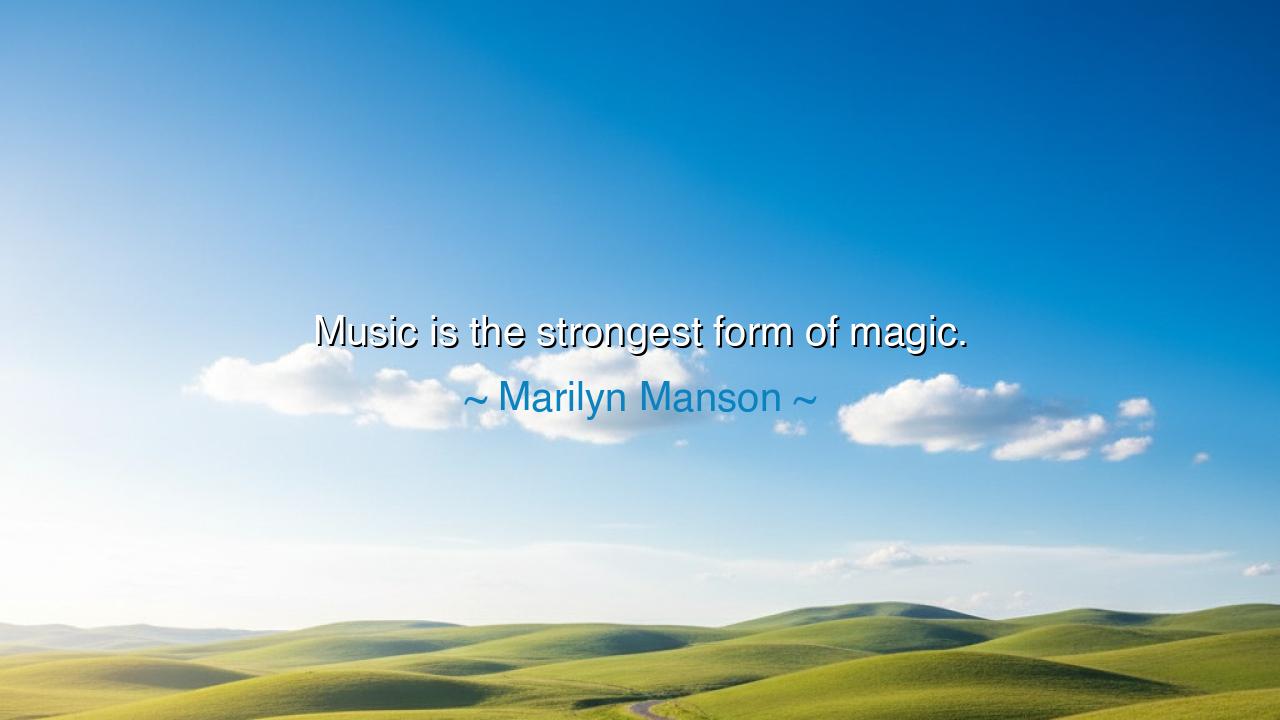
Music is the strongest form of magic.






Marilyn Manson, a figure both controversial and profound, once declared: “Music is the strongest form of magic.” Though born from the lips of one who shocked and provoked, these words ring with an ancient truth. For indeed, long before men forged spells in ink or carved charms in stone, they found power in sound. A song could rouse courage, soothe grief, or summon tears as if from the soul’s hidden well. In this sense, music is not entertainment alone but a force that alters the spirit, bends the heart, and shapes the unseen currents of human life.
To call music a form of magic is to recognize that it carries effects beyond reason. A man may explain harmony with science, describe rhythm with mathematics, and analyze melody with logic. Yet no scholar can capture why a single chord can pierce the heart or why a simple lullaby can calm a crying child. This is the realm of the invisible, the mystery that cannot be dissected, only felt. Like magic, music transcends the visible world, shaping emotions and memories in ways words alone cannot.
History testifies to this truth. In ancient Greece, Orpheus was said to charm wild beasts and even soften the heart of Hades with his lyre. Though myth, the story reveals how deeply humans have always felt music’s spell. In more recent times, consider the Civil Rights Movement of the 1960s. Songs like We Shall Overcome did not carry weapons, yet they gave strength, courage, and unity to those who sang them. The people were emboldened not by steel, but by song. Was this not a form of magic, binding souls together with invisible chains stronger than iron?
And yet, this magic is not always gentle. It can stir nations to glory, but also to war. Military drums and anthems have sent armies marching into battle with fire in their hearts. The same power that comforts a grieving widow can also rouse rage in the hearts of men. Thus, like all forms of magic, music is neither good nor evil in itself—it is the wielder who gives it shape. The ancient ones knew this, which is why they used music in temples, in healing, in festivals, but also in war and conquest.
Marilyn Manson, in his own way, was speaking to this double-edged truth. He himself wielded music as a form of transformation, casting spells upon audiences who were drawn to the raw, chaotic, and cathartic power of his sound. He understood what the ancients had always known: that to command music is to command emotions, and to command emotions is to hold sway over the deepest part of humanity.
The meaning of his words is therefore this: while other forces can move the body, music alone can move the soul. Wealth may command obedience, and power may enforce fear, but only song can bend the heart willingly. This is why music is the strongest magic—because it does not coerce; it enchants. It does not seize; it transforms. And those touched by it are not merely changed in the moment but carry its spell in memory, sometimes for a lifetime.
For us who hear this teaching, the lesson is clear: treat music with reverence. Do not consume it thoughtlessly, as noise or distraction, but recognize its power to shape your mind and spirit. Choose carefully the music you let into your soul, for it will work upon you like a spell. And likewise, when you create music, whether with instrument, voice, or simple hum, remember that you are wielding magic—the power to heal, to unite, to inspire, or to destroy.
Thus, let Manson’s words echo across time: “Music is the strongest form of magic.” Let all who hear remember that within every song is a spell, within every melody an incantation. Use it wisely, seek it humbly, and carry it as both shield and sword upon the journey of life. For those who master this magic may not conquer kingdoms, but they may conquer hearts—and that is the greater victory.






AAdministratorAdministrator
Welcome, honored guests. Please leave a comment, we will respond soon